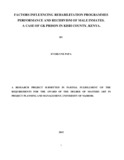| dc.description.abstract | This study was set out to establish factors influencing Rehabilitation Programmes performance and
recidivism of male inmates that assist in changing criminal behavior, successful re-integration and
reducing recidivism among imprisoned persons in Kisii Main prison; Kenya. Criminal’s behavior
change rather than inflicting pain to criminals. Rehabilitation goal is to prevent recidivism rather
than inflicting pain to the convicted persons. This study was guided by five objectives;
Determining how access to spiritual religious programmes influences male inmates recidivism in
kisii Main prison. Examining how social and psychological programmmes influences
rehabilitation programmes performance on recidivism of male inmates in Kisii Main prison.
Assessing how literacy training and education influences rehabilitation programmes performance
on recidivism of male inmates in Kisii Main prison. To establish the extent to which Mandatory
skills training influences rehabilitation programmes performance on recidivism. The study adopted
Relapse Prevention theory provides a mechanism to assess the performance of rehabilitation
programmes on criminals behavior change over time and avoid relapse. Relapse Prevention is a
cognitive behavior model with origins in Bunduras, (1977) self efficacy theory which presents a
comprehensive and integrated framework for explaining the change process in psychotherapy.
Descriptive research Design was used which was suitable in helping to describe and portray
characteristics of male inmates. The target population for this study was the entire group of male
inmates which were 1300, that is, prison personnel and prisoners. The research selected the
representative sample of 130 respondents from the target beneficiary population of 1300
respondents. The researcher used fisher’s model to calculate the sample size. Data collected was,
primary source data collected using observation, key informant interviews and two Questionnaires,
inmates and prison personnel Questionnaires and was divided into sections according to objectives
of the study, key informant interviews and observations list. Secondary sources included relevant
Documents and reports where techniques used to select available information on similar themes,
sub themes and statements were selected and qualitative findings were synchronized with
Quantitative findings. Quantitative data was coded; analyzed using descriptive statistics (frequency
and percentages) were used to describe the population. Tables were used to present the study,
statistical package for social sciences (spss) Computer software was used for analysis of
quantitative data (spss version17.0).The research observed the principles of respect, benefice and
justice of the respondents. The prison personnel role needs to be expanded from guarding
criminals to being mentors, counselors and educators which was possible through training,
spiritual and social welfare guidance and counseling helps in reducing recidivism and successful
re-integration of inmates back to the society. Rehabilitation programmes performance, reduced
recidivism of male inmates as established with over 75% of the respondents seemed to agree.
Prison rehabilitation programmes are enough to reduce recidivism. The researcher suggested
further research to be carried out on factors influencing recidivism of male inmates after release
from prison. | en_US |

